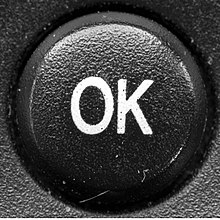
Back أوكي Arabic أوكي ARZ اوکئی (Ok) AZB Basst scho BAR Окей Bulgarian ওকে Bengali/Bangla OK Catalan O. k. Czech Ĕриса CV Okay Danish

OK (/ˌoʊˈkeɪ/ ), with spelling variations including okay, okeh, O.K., ok and Ok, as well as k in texting, is an English word (originating in American English) denoting approval, acceptance, agreement, assent, acknowledgment, or a sign of indifference. OK is frequently used as a loanword in other languages. It has been described as the most frequently spoken or written word on the planet.[1]
The origin of OK is disputed; however, most modern reference works hold that it originated around Boston as part of a fad in the late 1830s of abbreviating misspellings; that it is an initialism of "oll korrect" as a misspelling of "all correct". This origin was first described by linguist Allen Walker Read in the 1960s.
As an adjective, OK principally means "adequate" or "acceptable" as a contrast to "bad" ("The boss approved this, so it is OK to send out"); it can also mean "mediocre" when used in contrast with "good" ("The french fries were great, but the burger was just OK"). It fulfills a similar role as an adverb ("Wow, you did OK for your first time skiing!"). As an interjection, it can denote compliance ("OK, I will do that"),[2] or agreement ("OK, that is fine"). It can mean "assent" when it is used as a noun ("the boss gave her the OK to the purchase") or, more colloquially, as a verb ("the boss OKed the purchase"). OK, as an adjective, can express acknowledgement without approval.[3] As a versatile discourse marker or continuer, it can also be used with appropriate intonation to show doubt or to seek confirmation ("OK?", "Is that OK?").[4][2] Some of this variation in use and shape of the word is also found in other languages.[5]
- ^ "OK, 'most spoken word on the planet', marks its 175th anniversary". South China Morning Post. 23 March 2014. Retrieved 12 June 2022.
- ^ a b Couper-Kuhlen, Elizabeth (17 March 2021), "The prosody and phonetics of OKAY in American English", in Betz, Emma; Deppermann, Arnulf; Mondada, Lorenza; Sorjonen, Marja-Leena (eds.), OKAY across Languages: Toward a comparative approach to its use in talk-in-interaction, Studies in Language and Social Interaction, vol. 34, John Benjamins (published 2021), pp. 131–173, doi:10.1075/slsi.34.05cou, ISBN 9789027260284, ISSN 1879-3983, S2CID 233623150
- ^ Beaver 2011.
- ^ Yngve, Victor. "On getting a word in edgewise," page 568. Papers from the Sixth Regional Meeting [of the] Chicago Linguistic Society, 1970.
- ^ Betz, Emma; Sorjonen, Marja-Leena (17 March 2021), "Introduction: OKAY emerging as a cross-linguistic object of study in prior research", in Betz, Emma; Deppermann, Arnulf; Mondada, Lorenza; Sorjonen, Marja-Leena (eds.), OKAY across Languages: Toward a comparative approach to its use in talk-in-interaction, Studies in Language and Social Interaction, John Benjamins (published 2021), pp. 2–28, doi:10.1075/slsi.34.01bet, ISBN 9789027260284, ISSN 1879-3983, S2CID 233639474
© MMXXIII Rich X Search. We shall prevail. All rights reserved. Rich X Search